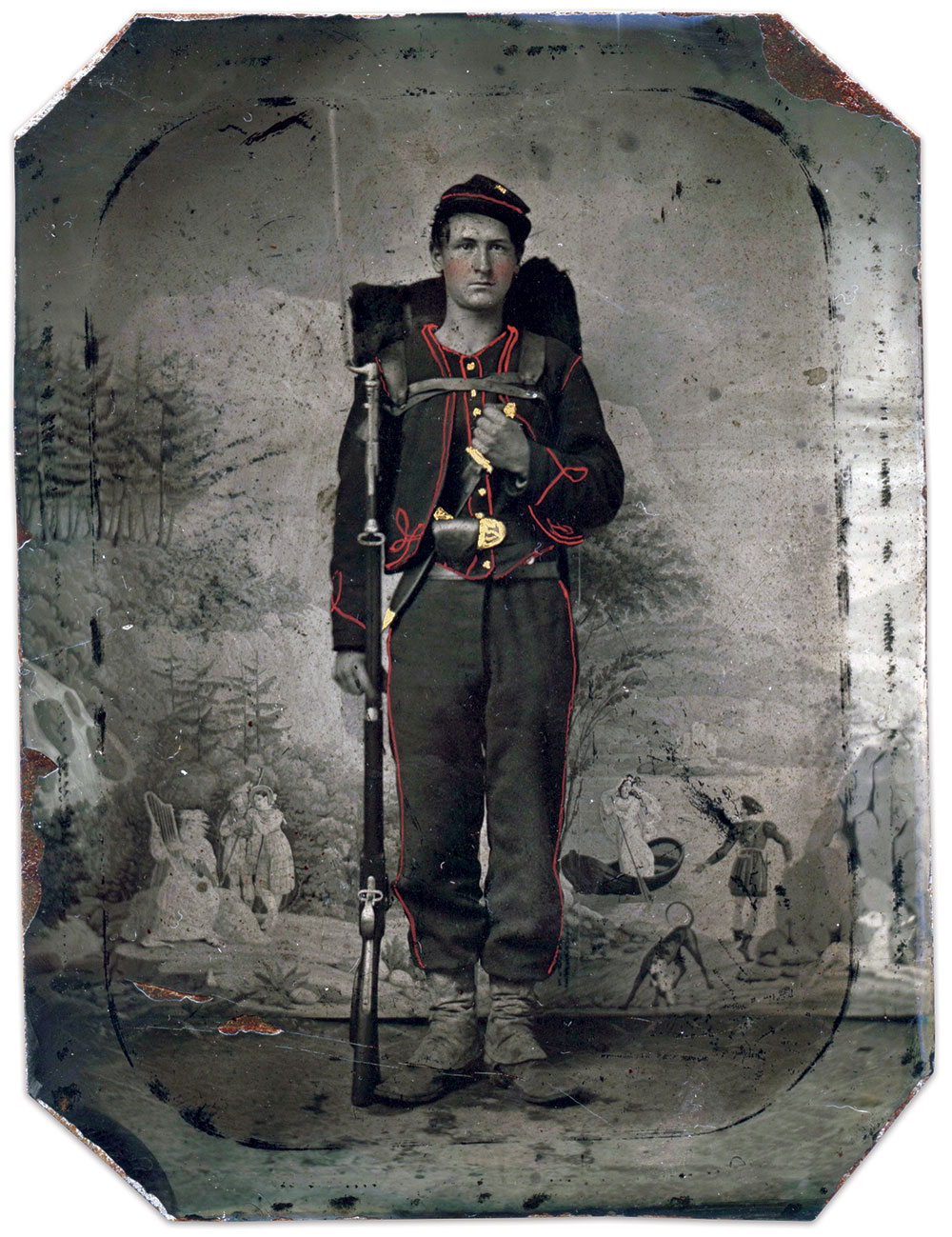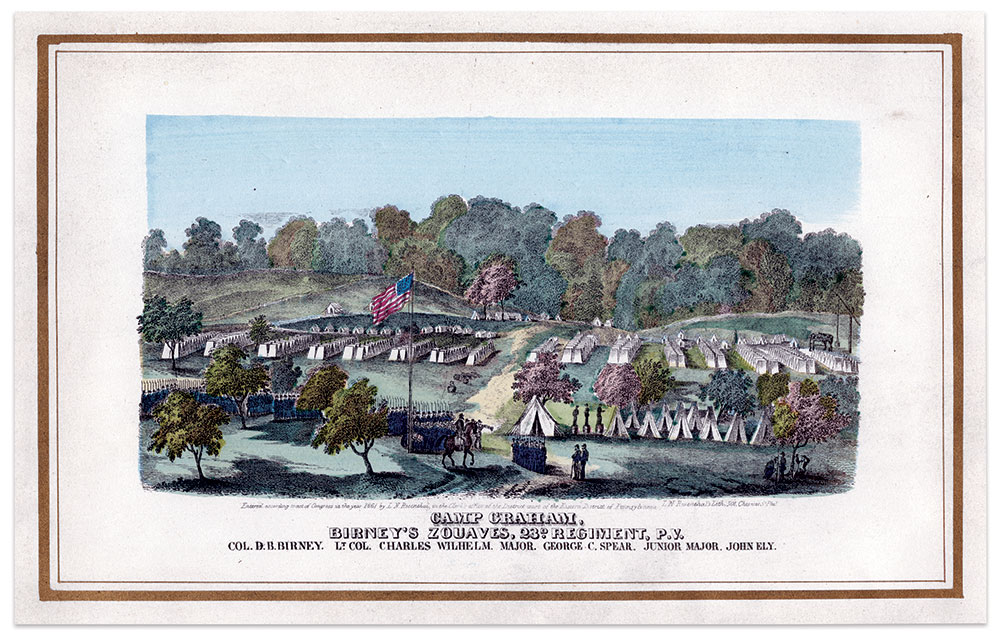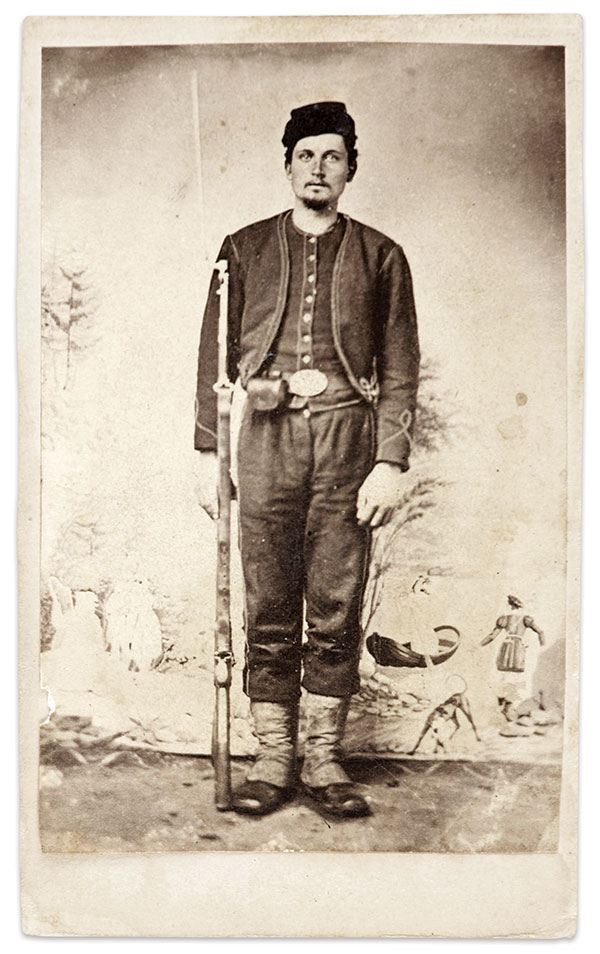By Adam Ochs Fleischer
The backdrop highlighted in this installment is the only example I have cataloged thus far featuring subjects from a single regiment: the 23rd Pennsylvania Infantry, also known as “Birney’s Zouaves.” If the “Harp Backdrop of Camp Graham” has been featured in portraits of soldiers from other regiments, I have yet to find them.

The backdrop is unusual in that it was located in a military camp outside Washington D.C., but its design is not military in nature. The vast majority of backdrops used during the Civil War in the D.C. area depict soldiers on sentry, grand camps, cannons and various patriotic symbols. By comparison, their absence makes the Harp Backdrop of Camp Graham quite memorable.
Birney’s Zouaves
The 23rd Pennsylvania, “Birney’s Zouaves,” was a hard-fought regiment primarily engaged in the Eastern Theatre of the Civil War. Its eponymous leader, Col. David B. Birney, raised, outfitted and equipped the unit at his own expense. Though the 23rd participated in the Battle of Gettysburg, fighting at Culp’s Hill, it is still probably best known today for the French Zouave-inspired uniforms paid for by Birney and issued to soldiers in his regiment. This distinctive dress has significantly aided in the identification of the Harp Backdrop of Camp Graham, as unidentified subjects can still be tied to the regiment by their clothing.
Camp Graham

Camp Graham was the name given to one of the many short-lived Union army training and mobilization camps established during the American Civil War around Washington. Located on “Queen’s Farm” in northeast D.C., Birney’s Zouaves occupied the camp from September 1861 to February 1862. Named after Brig. Gen. Lawrence Pike Graham, the regiment’s brigade commander, the camp was a hub of activity, and even included a theatre built by the soldiers for their entertainment. Ostensibly at least one photographer set up shop and took advantage of the willing and able clientele.
The backdrop

The Harp Backdrop of Camp Graham depicts a scene completely at odds with typical military camp backdrops used during the Civil War era. When one considers the brevity of Camp Graham’s existence so early in the war, it seems likely that the unknown photographer had already used the backdrop prior to the onset of hostilities. Alternatively, it may simply have been the only backdrop available for purchase on short notice when the photographer began taking portraits at Camp Graham.
The backdrop presents a bucolic scene featuring subjects in pseudo-medieval aristocratic garb. To the viewer’s right, a woman paddles a boat away from a man (perhaps her lover?) and a dog. To the viewer’s left, a bearded man plays a harp to the enjoyment of an audience of two. A lake, island and castle are also featured among woods and other flora. Similar dreamy Romantic imagery is commonly seen in antebellum backdrops.
Adam Ochs Fleischer is a passionate researcher of Civil War photography and an admitted image “addict.” He began collecting in high school and quickly became obsessed. He lives in Columbus, Ohio.
SPREAD THE WORD: We encourage you to share this story on social media and elsewhere to educate and raise awareness. If you wish to use any image on this page for another purpose, please request permission.
LEARN MORE about Military Images, America’s only magazine dedicated to showcasing, interpreting and preserving Civil War portrait photography.
VISIT OUR STORE to subscribe, renew a subscription, and more.

